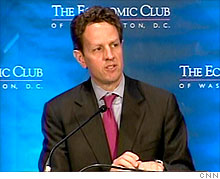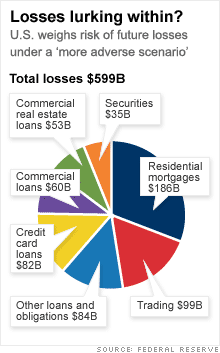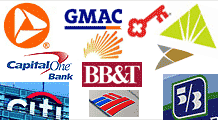Big banks to the feds: Thanks but no thanks
Banks needing to raise capital because of stress-test results rush to emphasize they won't be needing further government assistance, thanks very much.
 |
| Tim Geithner said the stress tests will help banks raise capital from private sources. |

NEW YORK (Fortune) -- Now that the stress tests are over, the big banks can't emphasize enough that they don't need any more help from the government.
Federal regulators unveiled the findings of their Supervisory Capital Assessment Program on Thursday afternoon, saying 10 banks need to raise a total of $74.6 billion in new common equity. Bank watchdogs at the Federal Reserve, Federal Deposit Insurance Corp. and the Office of the Comptroller of the Currency have been working on the tests since Treasury Secretary Tim Geithner introduced them in February.
Within minutes of the release of the findings, though, three major institutions - Wells Fargo (WFC, Fortune 500), Morgan Stanley (MS, Fortune 500) and Citigroup (C, Fortune 500) - had unveiled plans to raise capital from private investors. Two others - regional banks PNC (PNC, Fortune 500) of Pittsburgh and Fifth Third (FITB, Fortune 500) of Cincinnati - said they would meet their increased capital requirements by working with private funding sources, though they didn't specify how.
The bottom line: Banks that might not have made it through last fall's market collapse without government assistance - ranging from capital injections to expanded deposit insurance to debt guarantees - are now turning cartwheels to show that they don't need federal help.
The comments come after Geithner told reporters in a conference call Thursday that the stress tests would bolster the strength of the banking system while minimizing government intervention.
"Our sense is these banks are reasonably confident they will be able to raise incremental capital needs from private sources," Geithner said in the conference call. He said the transparency and increased disclosure associated with the stress test would "clear the way" for private capital to return to the banking system.
So far, so good on that count.
Wells Fargo, which needs to boost its common equity by $13.7 billion as a result of the test, said it would sell $6 billion of stock to the public. Morgan Stanley, which was ordered to raise $1.8 billion, said it will sell $2 billion of stock and $3 billion of bonds that aren't guaranteed by the FDIC - a precondition of repaying funds received last fall under the Troubled Asset Relief Program.
PNC, which was told it needs to boost its common equity by $600 million, didn't make definitive plans but said it will meet its obligations "through a combination of growth in retained earnings and other capital market alternatives."
Likewise, Fifth Third, which needs to boost its common equity by $1.1 billion, said in a statement that it "expects to utilize available private market alternatives."
Even Citi, the financial services giant that has taken $45 billion in federal capital and some $300 billion in asset guarantees, was quick with a plan to bring in new common equity. It expanded a program announced in February that will swap privately owned preferred shares, along with some government-owned ones, for common stock.
The lengths banks will go to to show they aren't going to take any more money from the government was illustrated by the stance taken by Bank of America (BAC, Fortune 500), which has taken $45 billion in federal capital and $118 billion in asset guarantees.
Regulators told BofA to raise its common equity position - reflecting the stake held by the direct owners of the company - by $34 billion. BofA responded by emphasizing that it doesn't need more money to meet that demand - and won't need additional help from taxpayers.
"We are comfortable with our current capital position in the present economic environment," CEO Kenneth D. Lewis said. Of the bank's plan to raise new capital, he said, "While it would have a number of components, we will not need any new government money."
Of course, Lewis is particularly eager to avoid taking any new government funds, because of his weakening hold on BofA. Shareholders, irate over his ill-advised decisions to pay up for Countrywide and Merrill Lynch when both were on the brink of collapse, stripped Lewis last week of his chairmanship.
Geithner, asked Thursday whether the government would change managers or directors at banks receiving further federal aid, responded that "we would at that point evaluate whether management is strong enough to lead institution."
Banks that seem unlikely to find themselves in that tight spot were quick to point that out Thursday. Institutions including American Express (AXP, Fortune 500), Goldman Sachs (GS, Fortune 500), State Street (STT, Fortune 500) and JPMorgan Chase (JPM, Fortune 500) were out with statements noting they had passed the tests with flying colors.
"We are committed to supporting healthy economic growth and to doing our part to help our country through these tough times," JPMorgan Chase chief Jamie Dimon said in a statement. "In particular, we remain committed to safe and sound lending and to being a responsible corporate citizen." ![]()
-
 The retail giant tops the Fortune 500 for the second year in a row. Who else made the list? More
The retail giant tops the Fortune 500 for the second year in a row. Who else made the list? More -
 This group of companies is all about social networking to connect with their customers. More
This group of companies is all about social networking to connect with their customers. More -
 The fight over the cholesterol medication is keeping a generic version from hitting the market. More
The fight over the cholesterol medication is keeping a generic version from hitting the market. More -
 Bin Laden may be dead, but the terrorist group he led doesn't need his money. More
Bin Laden may be dead, but the terrorist group he led doesn't need his money. More -
 U.S. real estate might be a mess, but in other parts of the world, home prices are jumping. More
U.S. real estate might be a mess, but in other parts of the world, home prices are jumping. More -
 Libya's output is a fraction of global production, but it's crucial to the nation's economy. More
Libya's output is a fraction of global production, but it's crucial to the nation's economy. More -
 Once rates start to rise, things could get ugly fast for our neighbors to the north. More
Once rates start to rise, things could get ugly fast for our neighbors to the north. More








